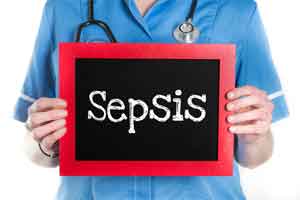- Home
- Editorial
- News
- Practice Guidelines
- Anesthesiology Guidelines
- Cancer Guidelines
- Cardiac Sciences Guidelines
- Critical Care Guidelines
- Dentistry Guidelines
- Dermatology Guidelines
- Diabetes and Endo Guidelines
- Diagnostics Guidelines
- ENT Guidelines
- Featured Practice Guidelines
- Gastroenterology Guidelines
- Geriatrics Guidelines
- Medicine Guidelines
- Nephrology Guidelines
- Neurosciences Guidelines
- Obs and Gynae Guidelines
- Ophthalmology Guidelines
- Orthopaedics Guidelines
- Paediatrics Guidelines
- Psychiatry Guidelines
- Pulmonology Guidelines
- Radiology Guidelines
- Surgery Guidelines
- Urology Guidelines
Early home nursing and first week post discharge OPD visit improve prognosis of Sepsis patients

Researchers in a new study have found out that a combination of early home health nursing and at least one outpatient physician visit in the first week after hospital discharge reduces the risk of 30-day hospital readmission for sepsis patients by seven percent.
More than 1 million sepsis survivors are discharged annually from acute care hospitals in the United States. Although the majority of these patients receive post-acute care (PAC) services, with over a third coming to home health care (HHC), sepsis survivors account for a majority of readmissions nationwide. Effective interventions are needed to decrease these poor outcomes.
A national study from the Center for Home Care Policy & Research at the Visiting Nurse Service of New York, in collaboration with the University of Pennsylvania School of Nursing (Penn Nursing), shows that the combination of early home health nursing and at least one outpatient physician visit in the first week after hospital discharge reduced the risk of 30-day hospital readmission for sepsis patients by seven percentage points. The investigators concluded that the combination of home nursing visits and early physician follow-up facilitates a coordinated care plan and early surveillance for new or recurrent problems.
“Our findings support integrated care management, including scheduling physician follow-up before discharge rather than recommending that patients schedule their own follow-up, as well as a clear communication that this is a sepsis survivor so HHC can activate early attention,” said Kathryn Bowles, PhD, FAAN, FACMI, van Ameringen Chair in Nursing Excellence, and the study’s co-principal investigator. “If translated nationally, this operational strategy could complement national and state initiatives to improve the acute and PAC outcomes of sepsis survivors.” “Our study revealed much room for improvement as only 28.1% of sepsis survivors transitioned to HHC received this intervention.”
The researchers’ findings have been published in the August issue of Medical Care in an article “Does Early Follow-Up Improve the Outcomes of Sepsis Survivors Discharged to Home Health Care?”

Disclaimer: This site is primarily intended for healthcare professionals. Any content/information on this website does not replace the advice of medical and/or health professionals and should not be construed as medical/diagnostic advice/endorsement or prescription. Use of this site is subject to our terms of use, privacy policy, advertisement policy. © 2020 Minerva Medical Treatment Pvt Ltd